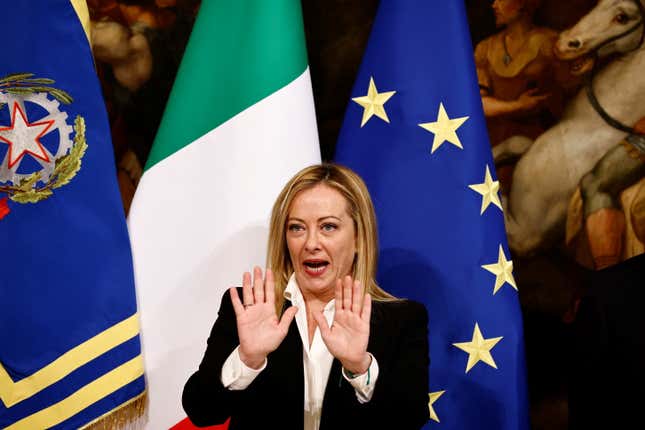
The way history is repeating itself in Italy is a bit on the nose as of late, with the current government trying to revive laws put in place a century ago during the fascist regime and abolished with the country’s liberation.
On February 11, 1923, the fascist government led by Benito Mussolini passed a law that became central to its “linguistic reclamation” project, a plan to preserve and protect the Italian language, and Italy’s culture, from foreign influence. The law, which aimed to dissuade people from using foreign words—or barbarismi, barbarisms, in line with the government’s revival of ancient Roman lore—imposed a hefty tax on anyone using foreign words on commercial signs.
Just over 100 years later, on March 31, 2023, Italy’s far-right Brothers of Italy (Fratelli d’Italia) party, led by prime minister Giorgia Meloni, proposed a law that would dictate the guidelines for the promotion and protection of the Italian language.
Meloni and her party, which displays proudly in its logo a flame in the colors of the Italian flag, once a symbol Italy’s neo-fascist party, insistently reject the label of fascist. Yet this latest proposal loudly carries the echo of the so-called Ventennio, Italy’s two decades of fascist reign.
Most notably, their eight-article proposal includes imposing a fine of up to €100,000 ($108,000) on the use of foresterismi, or foreign words that have Italian translations, in official and public-facing communications. This includes names or acronyms used for professional roles—say, manager, or CEO.
Sounds familiar—or, rather, suona familiare—doesn’t it?
Made in Italy
Although the current Italian government thinks all foreign words presents a threat to Italian, it’s especially concerned about English ones.
According to the proposal, the use of English in Italian professional communication has increased by 773% since 2000 (the methodology doesn’t discuss the raw numbers); words such as “look,” “business,” and “fashion” are used as much as 1% to 2% of the time. Among the roughly 800,000 words in the typical Italian dictionary, there are around 9,000 anglicisms, or 1.1% of the total.
That, says the government, is too many: It’s an Anglomania emergency.
“Whoever speaks only Italian today risks the failing of incommunicability,” reads the proposal. This is demeaning to the Italian language, it adds, especially because the UK is no longer in the European Union.
The proposal also establishes a “committee for the safeguard, promotion, and appreciation of Italian language,” although Italy already has such an institution, the Accademia della Crusca (known as La Crusca), which has been the ultimate authority in all matters of Italian language since 1538.
However, Meloni’s government doesn’t seem to have consulted with the body, just like the fascist government of a century ago disempowered La Crusca (link in Italian) by creating a “commission for the ‘Italian-ness’ (italianità) of the language.” The academy thinks the new proposal is so outlandish that it risks making bonafide efforts to preserve Italian look ridiculous, too.
The ministry of silly talks
Indeed, the proposal is ridiculous, especially coming from the very government that created a ministry named “Made in Italy.” In English!
Fascist initiatives to preserve Italian-ness quickly fell into ridiculousness, too. The first 1923 law took the lead from legislation in the late 19th century that double taxed businesses using foreign words, because it assumed they made more money. But the intent was not, as with its precedent, to make money for the government. It was to discourage the use of foreign words, starting with public-facing commercial communication.
With time, however, the bans became more serious, and speaking in foreign languages—particularly English and French—was akin to treason. In 1940, the punishment was up to six months in jail for the use of foreign words.
Nouns were created to replace words including sandwich (tramezzino), cashmere (casimiro), croissant (cornetto), hip-hip hooray (eja eja alalà), and panorama (tuttochesivede). Foreign names were translated into Italian, for instance Buenos Aires (Buonaria), Louis Armstrong (Luigi Braccioforte), and George Washington (Giorgio Vosingtone). Existing Italian words were changed because they sounded foreign, so ananas (pineapple) became ananasso, and the famous entertainer Wanda Osiris became Vanda Osiri.
The foolishness didn’t end there. Insalata Russa (Russian salad), an Italian-style coleslaw, was renamed insalata tricolore (tricolor salad), and the wrench, known in Italian as chiave inglese (English key), became a chiavemorsa.
More than a laughing matter
But if it’s absurd and ridiculous, the approach isn’t funny. Normalizing absurdity, and feeling no embarrassment in taking laughable actions, is a common trait among authoritarians. Fascism showed it well: Italians read in the news that Mussolini was capable of all sorts of superhuman feats, such as swimming faster than boats, or harvesting entire fields alone in a matter of hours.
More recent examples abound (podcast link in Italian). Think of Venezuela’s Nicolas Maduro, hosting a daily salsa dancing show as his country suffered unrest; Belarus’s Alexander Lukashenko, carrying watermelons to meet with Steven Seagal; Ukraine’s Viktor Yanukovych, who would use made-up words; Turkmenistan’s Saparmurat Niyazov, who changed the names of the month; Ecuador’s Abdalá Bucaram, who dressed like Batman to talk to voters; or Muammar Qaddafi, who killed flies with a golden swatter.
Behind the surreal nature of authoritarian idiosyncrasies is the belief that the ruled people will stop having a perception of the ridiculous, trusting the value of their leaders regardless of whether what they do makes any sense.
With its decision, Italy’s government is following fascist footsteps not only in the autarchic belief that the country must protect itself against foreign influence, but also in asking its citizens to follow absurd rules. It isn’t just making itself the laughing stock of the world. It’s trying to tell its citizens that it doesn’t matter what a rational observer might see from outside—their government knows best.